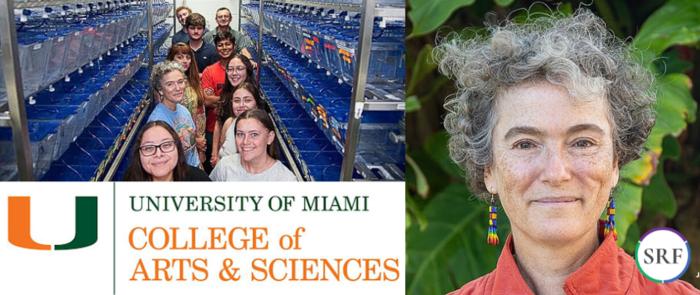
Dr. Julia Dallman, an Associate Professor of Biology at the University of Miami, is set to explore a novel approach to addressing gastrointestinal (GI) challenges associated with SYNGAP1-related disorders (SRD). With recent funding of $65,000 from the SynGAP Research Fund (SRF), her research aims to investigate familiar concerns such as chronic constipation and feeding difficulties that significantly affect the quality of life of individuals living with this rare genetic disorder. The grant, awarded as part of SRF’s ongoing commitment to advancing knowledge around SYNGAP1, emphasizes the importance of addressing the lesser-discussed but highly debilitating symptoms that can accompany more recognized neurological effects.
Dr. Dallman’s research is groundbreaking as it utilizes zebrafish models to identify potential therapies for GI issues linked to SRD. The approach aims to screen various pro-GI motility compounds, including prebiotics and bacterial metabolites, influential in targeting the gut microbiome. This exploration involves assessing their effectiveness in enhancing gut motility, specifically measuring bead transit time in zebrafish. The zebrafish model offers significant advantages for high-throughput testing, enabling researchers to quickly evaluate the impact of multiple compounds within a controlled environment. The fluid genetic and physiological responses observed in these models provide insights relevant to human conditions, making them a vital tool for medical research.
Understanding the intricate relationship between the gut and neurological manifestations is critical in the case of SYNGAP1-related disorders, wherein patients often experience overlapping symptoms. This research aims to identify viable therapeutic candidates that offer immediate relief to patients suffering from distressing GI symptoms, which, unbeknownst to many, can exacerbate behavioral and neurological challenges. By identifying effective treatments for GI issues, Dr. Dallman’s study could lead to improved overall well-being and symptom management for patients and their families faced with the complexities of SRD.
Research has consistently shown that GI issues are not only prevalent but significantly debilitating for patients with SRD. Chronic constipation, poor gut motility, and feeding challenges are common inconveniences embedded in the daily lives of these patients, perpetuating a cycle of suffering that affects not only physical health but emotional and psychological wellbeing. The urgent need to address these symptoms has become a focal point of Dallman’s research. Enhanced gut function translates to better overall health—improved appetite, reduced discomfort, and ultimately, a marked improvement in quality of life.
In her work, Dr. Dallman has made substantial advancements in understanding the genetic, neurological, and gastrointestinal complexities of SYNGAP1-related disorders. Her use of zebrafish as a high-throughput model is notable. This innovative strategy allows researchers to gather extensive data efficiently, thereby accelerating the pace of scientific discovery. Past webinars hosted by the SRF featured Dallman discussing her integrative approach toward examining the comorbidities associated with SRD, underlining her substantial contributions in bridging the gaps between various symptomatologies.
Family donations play a crucial role in supporting research initiatives like Dr. Dallman’s. The reality is that federal funding for condition-specific GI therapies remains scarce, making community contributions essential. Families directly sponsoring research projects can catalyze significant advancements, mobilizing resources that would otherwise remain untapped. Their contributions enable scientists not only to explore potential therapies but also to transform findings into tangible, effective treatments that target specific symptoms faced by the SRD community.
The significance of Dr. Dallman’s research goes beyond the confines of academic inquiry; it resonates deeply within the lives of families navigating the challenges posed by SYNGAP1-related disorders. Her collaborative efforts with the SynGAP Research Fund highlight a concerted commitment to bridging the gap between research and patient care. The collaboration between academic researchers and advocacy organizations elevates the potential of clinical applications derived from laboratory discoveries, ensuring that research aligns with patient needs.
It is particularly important to note that the focus on GI therapies opens new avenues for understanding complex interactions between the gut microbiome and neurological symptoms. This research evokes the need for broader discourse on the interconnectivity of bodily systems, particularly when dealing with genetic disorders. Behavioral symptoms often observed in SRD patients could potentially be alleviated by addressing their underlying physical health issues. Identifying treatments that can promote gut health might simultaneously mitigate some of the neurological challenges faced by these patients.
Dr. Dallman’s plans to test 20 pre-existing compounds highlights an essential strategy in drug repurposing—a method that could fast-track the availability of effective therapies for underserved patient populations. Each compound will be assessed for its ability to enhance gastrointestinal function while monitoring its effects on other relevant phenotypes, including sleep patterns and sensory responses. This approach seeks to uncover integrated therapeutic opportunities that could enhance the day-to-day experiences of patients living with SRD.
In conclusion, Dr. Julia Dallman’s research epitomizes a significant step forward in the quest for effective treatments for SYNGAP1-related disorders. By focusing on gastrointestinal health—as often overlooked as it may be—her work serves not only to address a critical component of the patient experience but also ties into the larger narrative of holistic care. This initiative underscores the necessity of valuing every symptom in the context of genetic disorders and recognizing the potential for meaningful advancements through targeted research.
Subject of Research: SYNGAP1-related disorders and gastrointestinal therapies
Article Title: Advancing Gastrointestinal Research for SYNGAP1 Disorders: A New Frontier in Treatment Approaches
News Publication Date: March 18, 2025
Web References: https://curesyngap1.org/
References: [To be completed]
Image Credits: Credit: SynGAP Research Fund
Keywords: SYNGAP1, gastrointestinal disorders, zebrafish model, drug repurposing, neurodevelopmental disorders, chronic constipation, quality of life, patient-centered research.
Tags: chronic constipation in SYNGAP1 disordersDr. Julia Dallman’s research initiativesenhancing gut motility therapiesfeeding difficulties in genetic disordersgastrointestinal treatment developmentgut microbiome and healthhigh-throughput testing in researchpro-GI motility compounds screeningrare genetic disorder symptomsSynGAP Research Fund grantSYNGAP1 research advancementszebrafish models in biomedical research





